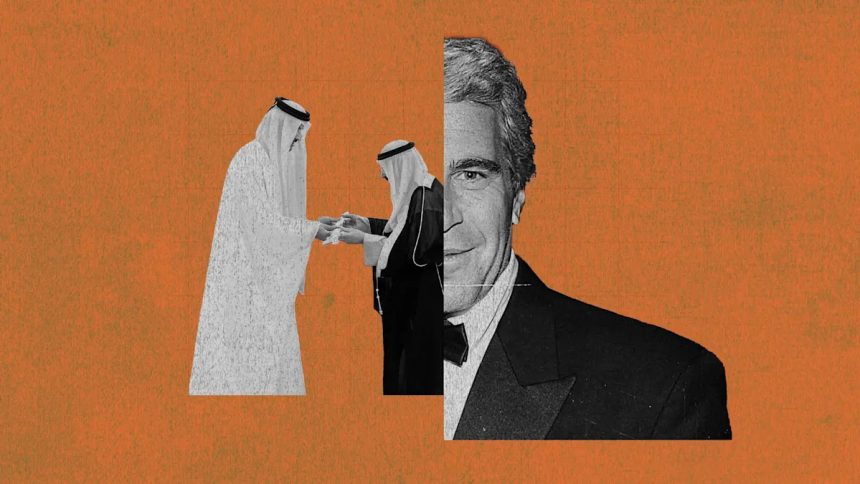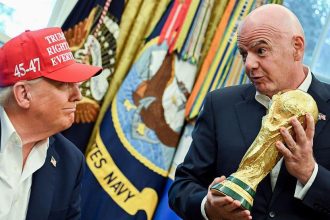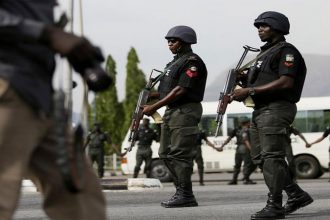President Donald Trump announced in 2017 that his first official overseas trip would be to the Middle East. An unnamed political figure, possibly from Kuwait, wanted to know how to deal with the new, unpredictable American leader. So the person turned to his acquaintance, Jeffrey Epstein.
“[A]ny tips on how we should communicate with him?” the figure wrote in an email. Epstein asked what “concrete” things the person’s emir (prince) would like the U.S. to offer. “[A] good word about the Amir’s effort to host the yemen peace talk will be great, i think..and if peace agreement was signed in kuwait that would be [thumbs up emoji],” the figure wrote back.
Kuwait had hosted unsuccessful peace talks in mid-2016 to resolve the Yemeni civil war, which was the worst humanitarian crisis in the Middle East at the time.
Epstein sent the person a link to a Jerusalem Post article about cosmetics heir Ronald Lauder’s attempts to act as a freelance diplomat. “[H]e just left my house when you arrived. [H]e is the key for you. I understand Dubai,” Epstein continued.
Lauder did not immediately respond to requests for comment sent through his company, Estée Lauder, or his nonprofit organization, the World Jewish Congress.
House Oversight Committee
Emails published as part of the House Oversight Committee’s investigation into Epstein’s estate this week shed new light on the late sex trafficker’s international political dealings. Long after his 2006 guilty plea, he was active and welcome in powerful circles. Epstein bragged to a former Norwegian president about passing on information about Trump to a Russian ambassador, and offered former Trump adviser Steve Bannon help meeting with politicians in Europe.
But the most intriguing revelations have been about Epstein’s dealings in the Middle East. Some of Epstein’s relationships to the region are already known. He kept a photo of himself with Saudi Crown Prince Mohammed bin Salman in his apartment, and did business with former Israeli Prime Minister Ehud Barak, while helping Barak set up backchannel contacts with Russia to negotiate over the future of Syria.
The House Oversight Committee’s disclosures add two other countries to the mix. Along with the mysterious figure asking about favors for Kuwait—the name is completely redacted—the emails show that Epstein was in contact with an influential man in Qatar referred to only as “Jabor Y.”
In November 2016, shortly before the U.S. election, Epstein apologized to Jabor for canceling an audience that Jabor had arranged with Hamad bin Khalifa Al Thani, the then-retired emir of Qatar. “[T]oo much work around the election,” Epstein wrote, adding that “the states will be in turmoil for awhile no matter who wins” and promising to “explain when i see you.”

House Oversight Committee
It’s unclear whether he ever rescheduled the meeting. The exact identity of the Qatari man is also unclear. However, a group of influential names that Epstein sent to himself with the title “list for bannon steve” includes “HBJ,” a nickname commonly used for Hamad bin Jassim bin Jaber Al Thani, the former prime minister of Qatar.
The Qatari foreign ministry and Qatari embassy in Washington did not immediately respond to requests for comment.
The disclosures also touch on Epstein’s longstanding relationship with Thomas Barrack, a real estate investor close to Trump. During the 2016 election, Barrack was a major fundraiser for the Trump campaign. He now serves as U.S. ambassador to Turkey and Trump’s special envoy to Syria.
In March 2016, Epstein and Barrack made small talk via email. Barrack asked Epstein to “catch up,” while Epstein complained about the constant questions from the media about his relationships with Trump and former President Bill Clinton. “[S]end photos of you and child,” Epstein added. “[M]ake me smile.”
Barrack did not respond to a request for comment sent to him through the U.S. State Department’s Bureau of Near Eastern Affairs, where he works.

House Oversight Committee
A few months later, Epstein wrote to businessman Peter Thiel, “dont know how well you know tom barrack he is great.” Epstein would go on to introduce Thiel and Barrack separately to Russian Ambassador to the United Nations Vitaly Churkin, according to schedules obtained by The Wall Street Journal. Thiel told the Journal that Epstein was “a crazed networker and low on substance,” adding, “I didn’t think enough about what Epstein’s agenda might have been.”

House Oversight Committee
In January 2017, according to the House Oversight Committee emails, Epstein told Emirati businessman Sultan Ahmed bin Sulayem that “it might be worth it” to accept an invitation from Barrack to attend Trump’s inauguration. “Do you think it will be possible to shake hand with trump,” bin Sulayem wrote back. Epstein told bin Sulayem to call him on the phone.

House Oversight Committee
Emails from the Handala leaks show Epstein introduced Barak to bin Sulayem in 2013, describing bin Sulayem as “the right hand of maktoum,” the ruling family of Dubai. In 2015, bin Sulayem reached out to Epstein to arrange another meeting with Barak, for reasons unexplained. Epstein also kept a photo of himself with bin Sulayem in his apartment, according to images released by The New York Times.
Bin Sulayem’s company did not respond to a request for comment.
Epstein, a financial manager by trade, was interested in mixing business with politics. He frequently wrote to Barak about his excitement for military and intelligence affairs. The past two decades of chaos in the Middle East offered Epstein plenty of opportunities to get involved.
But the disclosures also underscore questions about the Epstein case. What value did so many influential political elites from around the world see in advice from a convicted sex offender? And what exactly was Epstein’s political endgame?
In a 2014 email, Epstein joked to a friend about the danger that her talk about “girls” will “renew an old habit.” Then he listed all the meetings he had lined up during the U.N. General Assembly in New York. They included power brokers from America, Europe, the Middle East, and beyond.
The post Jeffrey Epstein’s Secret Role in Washington’s Middle East Diplomacy appeared first on Reason.com.









